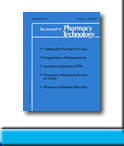 |
 |
AMIODARONE-ASSOCIATED
DEPRESSION
Ian D Maidment and Tim
Helme
To request full article click here.
OBJECTIVE:To report a case of depression secondary to or aggravated by amiodarone-induced hypothyroidism.
CASE SUMMARY: An 84-year-old white man was admitted to a psychiatric unit with severe depression approximately seven months after amiodarone had been initiated to treat paroxysmal supraventricular tachycardia. On admission, the thyroid-stimulating hormone (TSH) concentration was 11.50 µU/mL (normal 0.17–4.00) and the total thyroxine concentration was 3.9 µg/dL (4.0–11.0). About 21 months before initiation of amiodarone therapy, the TSH concentration was 2.4 µU/mL; this was the only previous TSH result available. Seven days after admission, thyroxine (levothyroxine) 25 µg/d was started. Twenty-eight days after admission, the patient's mood had improved, and the TSH concentration (2.67 µU/mL) was within normal range. The patient was discharged four days later.
DISCUSSION: Amiodarone contains 37.2% iodine. This is a greatly increased iodine load compared with normal intake. Amiodarone may therefore have three possible effects on thyroid function: (1) the serum concentration of thyroid hormones in clinically euthyroid patients may change, complicating assessment; (2) hyperthyroidism may occur (1–5% of patients); and (3) hypothyroidism may occur (6–10% of patients). Thus, thyroid function should be checked at least every six months. The elevated TSH concentration could indicate mild hypothyroidism or possibly be a symptom of the depressive illness. Furthermore, our patient's mood appeared to improve after he had received six to seven weeks of treatment with fluoxetine; he had also experienced depressive episodes throughout his life. Thus, particularly because the TSH concentration was only moderately raised, it is possible that amiodarone-induced hypothyroidism worsened rather than caused the depressive episode. The usual treatment for amiodarone-induced hypothyroidism is continuation of amiodarone and initiation of thyroxine at a dosage of 25–50 µg/d.
CONCLUSIONS: This case illustrates the need to be vigilant for amiodarone-induced hypothyroidism, which may cause depression or exacerbate an underlying depressive illness. Supplemental treatment with levothyroxine may effect a rapid mood response.
J Pharm Technol 1999;15:50-3.
To request full article click here.
|
|
|
||
|

